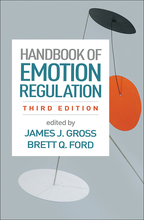Handbook of Emotion Regulation
Third Edition
Edited by James J. Gross and Brett Q. Ford
HardcoverPaperbacke-bookprint + e-book
Hardcover
orderFebruary 27, 2024
ISBN 9781462553037
Price: $98.00 606 Pages
Size: 7" x 10"
Paperback
orderFebruary 1, 2024
ISBN 9781462549412
Price: $65.00 606 Pages
Size: 7" x 10"
e-book
orderOctober 19, 2023
PDF and Accessible ePub ?
Price: $65.00 606 Pages
ePub is Global Certified Accessible
print + e-book $130.00 $78.00
orderPaperback + e-Book (PDF and Accessible ePub) ?
Price: 606 Pages
ePub is Global Certified Accessible
“Gross recruited an impressive array of authors who are well-known for making contributions to the study of affect and emotion....Ideal for graduate courses or seminars on emotion regulation.”

—Journal of Social and Clinical Psychology (on the first edition)
“This volume is a valuable reference for researchers and clinicians interested in either healthy or unhealthy management of emotions. It also would be an excellent text for graduate seminars devoted to the topic of emotions.”

—Journal of the American Medical Association (on the first edition)
“This third edition continues to evolve the study of emotion regulation, using expert research to identify emotion regulation’s effects on mental and physical health….The contributors are experts in the field and leaders at the forefront of psychology….This book will be quite useful for researchers and practitioners alike.*****”

—Doody's Review Service
“Biting one's tongue, controlling tears, and suppressing anger are emotion regulation processes shaped over millennia. Given the importance of this uniquely human strategy, it is surprising that researchers only recently have turned their efforts to studying the why, when, and how of emotion regulation. With 71 clear, concise chapters, Gross and Ford take scholars and students on a scientific journey through all there is to learn about this booming research area. The third edition of this preeminent handbook will be absorbed, borrowed, and dog-eared by eager readers looking for the latest on the science of emotion regulation.”

—Wendy Berry Mendes, PhD, Department of Psychology, Yale University
“Whether you are a researcher, teacher, therapist, or student, this volume is a gold mine of vital information. That’s because emotion regulation is at the very heart of effective functioning, the successful meeting of goals, and satisfaction with life. As I surveyed the third edition's table of contents, I couldn’t wait to hear the latest findings from the top scholars in the field. This is truly a landmark volume.”

—Carol S. Dweck, PhD, Lewis and Virginia Eaton Professor of Psychology, Stanford University
“This brilliant and comprehensive handbook brings together the striking progress made in understanding emotion regulation. The book spans the field, from emotional functioning in neurological patients to the regulation of collective emotions. It showcases the robust science that is revealing how the many facets of emotion regulation shape every aspect of our lives. A 'must read' for anyone interested in this vital topic.”

—Dacher Keltner, PhD, Department of Psychology, University of California, Berkeley
“The third edition of this handbook, like the two previous editions, is a superbly edited reference. It's a perfect resource for anyone interested in exciting developments, pressing questions, and opportunities for powerful interventions in the area of emotion regulation.”

—Lisa Feldman Barrett, PhD, University Distinguished Professor of Psychology, Northeastern University
—Journal of Social and Clinical Psychology (on the first edition)
“This volume is a valuable reference for researchers and clinicians interested in either healthy or unhealthy management of emotions. It also would be an excellent text for graduate seminars devoted to the topic of emotions.”
—Journal of the American Medical Association (on the first edition)
“This third edition continues to evolve the study of emotion regulation, using expert research to identify emotion regulation’s effects on mental and physical health….The contributors are experts in the field and leaders at the forefront of psychology….This book will be quite useful for researchers and practitioners alike.*****”
—Doody's Review Service
“Biting one's tongue, controlling tears, and suppressing anger are emotion regulation processes shaped over millennia. Given the importance of this uniquely human strategy, it is surprising that researchers only recently have turned their efforts to studying the why, when, and how of emotion regulation. With 71 clear, concise chapters, Gross and Ford take scholars and students on a scientific journey through all there is to learn about this booming research area. The third edition of this preeminent handbook will be absorbed, borrowed, and dog-eared by eager readers looking for the latest on the science of emotion regulation.”
—Wendy Berry Mendes, PhD, Department of Psychology, Yale University
“Whether you are a researcher, teacher, therapist, or student, this volume is a gold mine of vital information. That’s because emotion regulation is at the very heart of effective functioning, the successful meeting of goals, and satisfaction with life. As I surveyed the third edition's table of contents, I couldn’t wait to hear the latest findings from the top scholars in the field. This is truly a landmark volume.”
—Carol S. Dweck, PhD, Lewis and Virginia Eaton Professor of Psychology, Stanford University
“This brilliant and comprehensive handbook brings together the striking progress made in understanding emotion regulation. The book spans the field, from emotional functioning in neurological patients to the regulation of collective emotions. It showcases the robust science that is revealing how the many facets of emotion regulation shape every aspect of our lives. A 'must read' for anyone interested in this vital topic.”
—Dacher Keltner, PhD, Department of Psychology, University of California, Berkeley
“The third edition of this handbook, like the two previous editions, is a superbly edited reference. It's a perfect resource for anyone interested in exciting developments, pressing questions, and opportunities for powerful interventions in the area of emotion regulation.”
—Lisa Feldman Barrett, PhD, University Distinguished Professor of Psychology, Northeastern University



